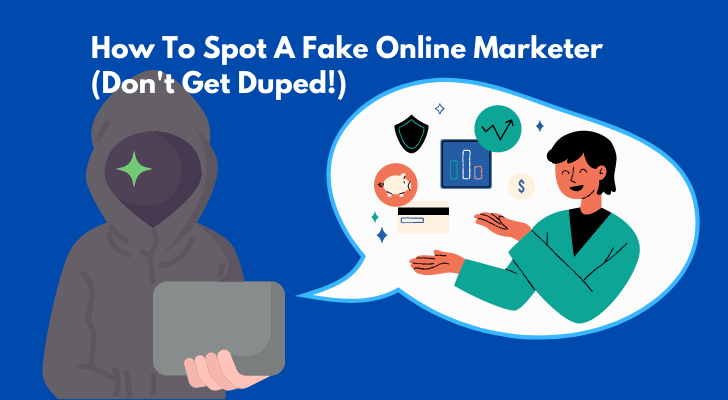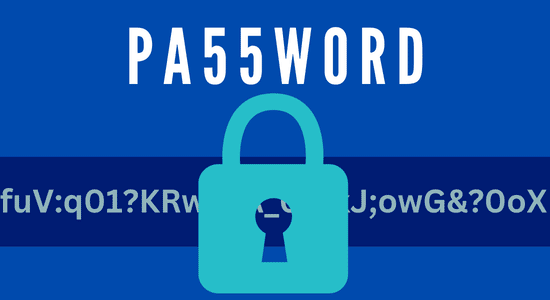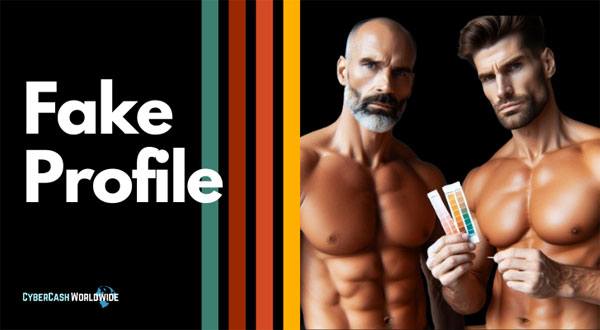Ever wondered if those so-called "experts" sliding into your DMs are genuine or just a bunch of smooth-talking charlatans? Those savvy internet users who are trying to navigate the treacherous waters of online marketing... They pretend to be experts but they may know nothing at all. They think they may think they're acting right but hey, if you know how to spot them, you'll avoid wasting so much time.
So today, you and I are going undercover to expose the secrets of spotting a fake online marketer. Don't worry, we won't be requiring any fancy detective gear or disguises (unless that's your thing!). Instead, we'll arm you with steps to help separate the true gurus from the pretenders in no time. So tighten up those metaphorical belts and let's dive in!

Did You Know?
- 95% of consumers report encountering fake reviews or ratings online, which are often used by fraudulent marketers to promote products.
- Up to $1.3 billion is lost to online scams in the U.S. annually, with a portion of this attributed to fake marketing schemes.
- 43% of online shoppers have reported purchasing a product or service influenced by a fake review.
- Nearly 80% of consumers say they trust online reviews as much as personal recommendations, making them vulnerable to fake marketer tactics.
- Over 50% of digital marketing professionals have encountered fake influencers, a common tactic used by deceptive online marketers.
The Three-Step Litmus Test To Identify A Fake Online Marketer
Ready for some sleuthing action? Great! Let's start our investigation by unveiling our foolproof three-step litmus test that will leave even Sherlock Holmes impressed.
#1 Profile Test
First impressions can be deceiving, especially when it comes to online marketers. That's why the profile test is an essential part of identifying a fake advisor!
Profile test - 1
First of all, check whether the profile photo is real or fake. Here are some simple steps you can take:
- Search the photo: Use tools like Google Images to see if the photo appears in other places. It may be a stock photo or a photo repetitively used in the eastern countries (Russia or China.)
- Look for quality issues: AI-generated images can have small flaws. Check for pixelation, strange shadows, or anything that looks unnatural.
- Check the background: Is it completely plain? If so does it look like it was taken in a photo studio?
- Pay attention to the face: Does it look like it’s tampered with? Check for odd proportions or blurry edges.
- Use AI detection tools: There are special tools that use AI to analyze images and determine if they are AI-generated. Platforms like Sensity or Deepware.ai can help.
Profile Test - 2
Now check out their online presence. Start with their social media profiles – are they filled with spammy posts and generic inspirational quotes? Or do they offer valuable insights and engaging content?
Profile Test - 3
Next, take a peek at their website. Is it well-designed and professional-looking? Does it have informative blog posts or just a bunch of flashy ads? A true online marketer will invest time into creating relevant, high-quality content that showcases their expertise.
Profile Test - 4
Now, onto the tricky part – testimonials! Fake marketers often use fabricated reviews to boost their credibility. Don't fall for this trap! Take some time to research these testimonials – look for consistency in language and writing style. If something seems fishy or too good to be true, trust your gut instincts.
Profile Test - 5
Don't forget about the credentials! Legitimate online marketers will proudly display certifications from reputable organizations on their websites or LinkedIn profiles. If someone claims to be an expert but lacks any evidence of formal training or education in marketing, approach them with caution.
Did You Know?
- About 25% of all online ad clicks are considered fraudulent, with fake marketers contributing to these numbers.
- 10-15% of social media accounts are estimated to be fake, often used for fraudulent marketing purposes.
- $23 billion is estimated to be lost to ad fraud every year globally, with fake marketing practices playing a significant role.
- 70% of consumers feel overwhelmed by spam emails, with many originating from deceptive marketing campaigns.
- Nearly 60% of consumers have reported experiencing misleading advertising online, highlighting the prevalence of dishonest marketing tactics.
#2 Content Test
Okay, so you've checked out the online marketer's profile and it looks pretty legit. Now check their actual content.
Content Test - 1
Take a look at their blog articles or YouTube channel. Are they providing valuable content that you’ve never seen before? Did they make you wow? Or are they just regurgitating the same old generic advice that you can find anywhere on the internet?
A fake online marketer will often lack originality and simply recycle information without adding any real value.
Content Test - 2
Next, pay attention to their writing/talking style. Is it clear and concise? Do they use words that communicate directly or do they ramble on without making any coherent points? A genuine online marketer knows how to captivate users in a well-structured, no-time-wasting way.
Content Test - 3
How about consistency? Does this person consistently produce high-quality content or do they disappear for weeks at a time before publishing something mediocre? A reliable online marketer will have a consistent presence and deliver quality work consistently.
Did You Know?
- 40% of consumers have reported falling for a scam involving a fake online business or marketer.
- Phishing attacks, often used by deceptive marketers, have increased by 65% in the last year.
- 30% of eCommerce site traffic is generated by bots, with a significant portion deployed by fraudulent marketers.
- 85% of consumers believe that not enough is being done to protect them from online fraud, including fake marketing.
- 22% of online consumers have mistakenly bought counterfeit goods, often marketed through sophisticated fake campaigns.
Content Test - 4
Take note of how the marketer presents themselves in their content. Are they approachable and relatable? Do they genuinely want to help others succeed or are they only focused on selling their services? An authentic online marketer will prioritize building relationships over making quick sales.
#3 Network Test

So, you've met someone online who claims to be an expert marketer. They talk the talk and promise to boost your business like never before. But how can you really tell if they're the real deal or just another fake online marketer? Well, my friend, let me introduce you to the Network Test – the third step in our litmus test for spotting a faker.
Network Test - 1
When it comes to networking, a true marketing guru knows how to make real connections with others. They have a wide network of industry professionals, influencers, and satisfied clients who can vouch for their skills. So, take a peek at their social media profiles and see who they're connected with. Are they rubbing shoulders with other experts in your field? Or is their network suspiciously sparse?
Network Test - 2
Next up on our Network Test is engagement. A genuine online marketer will have an active presence on at least one major social network. Facebook page, Twitter. They'll be sharing valuable content regularly and engaging with their audience by responding to comments and messages promptly.
Network Test - 3
But beware of those who claim expertise but barely have any followers or engagement on social media. It's like throwing a party where no one shows up – not exactly a good sign!
Network Test - 4
Lastly (and this should go without saying), check out their website if they have one! A credible online marketer will have a well-designed website that showcases their portfolio of successful campaigns and testimonials from happy clients.
If all these areas pass the Network Test with flying colors, congratulations - you may have found yourself a legit marketing pro! However, if red flags start popping up left and right during this test... well my friend, it might be time to reconsider letting them anywhere near your precious business.
Did You Know?
- $7.4 billion was lost to Internet crime in the U.S. in 2023, with online marketing fraud contributing significantly.
- 48% of consumers report having received misleading information from what appeared to be legitimate online marketing campaigns.
- Over 60% of emails are spam, with a significant number being a direct result of fraudulent marketing efforts.
- 35% of fake online marketing victims spend several months to over a year recovering from the financial and emotional impact.
- Digital ad fraud is expected to grow, with losses potentially reaching $300 billion by 2025, driven by sophisticated fake marketing techniques.
What Should I Say When They Keep Pestering Me?
So you are the one who’s trying to establish your business, trying to make a good network of people - customers, advisors, suppliers. But those self-proclaimed marketing experts (investment gurus, or whatever) pop out from nowhere to try to sell stuff to you.
They may be real, they may be not. They just keep pestering you with unsolicited sales messages. What should you tell them?
Here’s the way you can handle the situation tactfully. A suggested response will be;
"Hello [Name],
Thank you for reaching out to me with your marketing offers. While I appreciate your interest, I must let you know that I am not currently looking for any marketing services or products. I kindly request that you refrain from sending me further messages.
I understand that you are passionate about your work, but unsolicited sales messages can be intrusive. It's always best to respect someone's boundaries and only reach out to individuals who have expressed genuine interest in your services.
I hope you understand and respect my decision. Wishing you success in your future endeavors.
Best regards, [Your Name]"
Just be polite and assertive in your response. If the person continues to bother you despite your request, ignore them!
It may be necessary to block or report them to the appropriate platform or authorities, but usually, if you keep ignoring them, they’ll stop messaging you. Just don’t be rude or threaten to report - you never know, they might come back to do something awfully unimaginable to you. Avoid getting backfired at all costs!
Protecting Your Account and Identity
We've all heard the horror stories of online scams, identity thefts, and fake marketers trying to weasel their way into our lives. But with a few simple steps, you can protect your account and keep those sneaky scammers at bay.

First off, passwords. Yes, I know it's tempting to use "pa55word123" or your pet's name as your go-to security code, but trust me - that won't cut it. Get creative! Mix up upper and lowercase letters, and throw in some numbers and special characters for good measure. And please, whatever you do, don't use the same password for every single one of your accounts. That's like leaving all your doors unlocked when you go on vacation!
Next up is two-factor authentication (2FA). It may sound fancy schmancy, but it's actually quite simple. Basically, it adds an extra layer of protection by requiring a second form of verification when logging into your accounts. So even if someone gets hold of your password (which they won't because you're following my brilliant advice), they'll still need another piece of the puzzle to gain access.
And needless to say - be vigilant online. Be wary of suspicious emails asking for personal information or promising unbelievable deals that are too good to be true (spoiler alert: they always are). Keep an eye out for phishing attempts – those crafty scammers will try anything to trick you into giving them access to your precious data.
Remember folks: protecting yourself from fake online marketers starts with taking control over who has access to your accounts and personal information! Stay safe out there in cyberspace!
(If anyone asks for sensitive info like your social security number or credit card details while claiming to be an expert advisor who can magically double your money overnight...run far away!)
How To Spot A Fake Online Marketer - Final Words
Armed with the Three-Step Litmus Test, you now possess the power to spot a fake online marketer from miles away. Trust your instincts and stay vigilant in this digital jungle. Let's all raise our virtual glasses to real professionals who truly know their stuff.
And to those sneaky fakers out there – beware! We won't be easily fooled by your flashy promises and empty claims anymore.
So go forth with confidence and let no fake advisor approach you without facing your scrutiny. Together, we can create a more trustworthy digital landscape where true experts shine bright and opportunists fade into oblivion!


